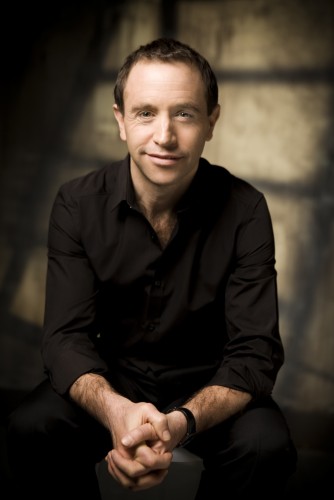Wigglesworth, New World illuminate Viennese masters with engrossing performances

Marl Wigglesworth conducted the New World Symphony in music of Brahms and Schoenberg Saturday night. Photo: Ben Ealovega
A concert devoted to music from Vienna could draw from the work of dozens of composers, including many of the world’s greatest.
Saturday night in Miami Beach, the New World Symphony played music by three composers from the late 19th century, when the glittering capitol of the music world tottered atop the decaying Austro-Hungarian Empire and Vienna was a roiling kettle of musical composition and controversy.
The New World program, titled “Music of Vienna,” brought together three of its leading figures: one a conservative German already considered one of the world’s greatest composers, the others young men who would go on to be among the most daring composers of their day.
Leading the orchestra for the two largest works on the program was Mark Wigglesworth, conductor of the English National Opera and a frequent guest conductor at New World.
Arnold Schoenberg’s 1899 work Transfigured Night, written in his 20s, remains his most popular composition. Like Stravinsky, who through his own long life saw his three early ballets remain the public’s favorites, Schoenberg would see audiences respond with the most enthusiasm to work that, advanced as it was, remained closest to the Romantic classical tradition.
Transfigured Night is based on a poem by the German poet Richard Demel, which tells of a moonlit night in a forest, in which a woman confesses to a man that she is carrying a baby that is not his, from a man she never loved. Her companion forgives her and declares the baby to be his, too.
Originally composed for string sextet, the work was arranged by Schoenberg for string orchestra, which was the version performed Saturday. The New World musicians produced a gorgeous string sound in Schoenberg’s aching, late-Romantic harmonies, with great weight and resonance, glowing, perfectly balanced pianissimos and a liquid flow to the music.
Although the weight of strings cost the work some of the leanness and clarity of the original chamber version, the performance retained a surprising amount of sharpness. And for all the richness of the string textures, the performance never shorted the drama, particularly in the agitated middle section, with its tremolo passages and sudden, sepulchral descents in the basses.
Despite the huge gulf between their compositional styles, Schoenberg was a great admirer of Brahms. Both composers produced music that was learned and logical, possibly to a fault. For a performance of the Brahms Symphony No. 1, Wigglesworth conducted the work from memory, usually an indication that the conductor feels particularly close to a work. He led an engrossing performance, fully capturing the spirit of a work that feels epic in scale, not only in terms of length but in terms of the vast journey traveled, from the drama and turbulence of the first movement to the light and triumph of the last.
Under his baton, the ominous power of the introduction came sharply to the fore, with the restatement of the dark opening theme arriving with sudden, ferocious force. Since the symphony’s first performance in 1876, many listeners have heard parallels with the works of Beethoven, and this came through with particular emphasis in this performance. The clipped, abrupt manner with which the orchestra played several passages of the Allegro clearly evoked the style of Brahms’ great predecessor. Throughout, the movement barreled forward with a baleful energy that effectively set the stage for the rest of the symphony.
The Andante drew a glowing tone from the orchestra. Wigglesworth led a brisk, pulsing performance. When one graceful ascending figures turns suddenly dark and intense, for example, he kept the music moving forward, allowing its power to emerge naturally, rather than milking it excessively, helping the music to maintain its forward momentum. Concertmaster Erin Zehngut gave a lithe, sweet-toned violin solo at the end of the movement.
The last movement received playing of breadth and grandeur. Horns and flutes deserve special mention for their evocative playing of the expansive theme, with its Alpine spaciousness and undertones of tension. As in the other movements, Wigglesworth led a propulsive performance. The movement has a pair of formal sounding brass choirs, for example, that sometimes seem to allow the action to grind to a halt, but in this performance they felt more integrated into the rest of the movement, adding to its drive. From sharply played contrapuntal passages to expansive string melodies, the performance brought out the vastness, inventiveness and humanity that accounts for the symphony’s rank among the world’s greatest.
The concert opened with Richard Strauss’s Serenade in E-flat Major, Op. 7, written when the composer was in his late teens. As its title implies, this is a light, Mozartean work, more obviously the predecessor of Rosenkavalier than Salome. New World’s conducting fellow Christian Reif led a flowing, natural performance, with crisp, taut playing in the dramatic middle section.
The New World Symphony repeats the program 2 p.m. Sunday at New World Center in Miami Beach. nws.edu; 305-673-3331
Posted in Performances
One Response to “Wigglesworth, New World illuminate Viennese masters with engrossing performances”
Leave a Comment
Sun Dec 13, 2015
at 1:57 pm
1 Comment







Posted Dec 14, 2015 at 8:15 am by Mario
We saw this performance as well on Saturday night and surprisingly enjoyed the Schoenberg more than the Brahms. Going into it the Brahms is the more accessible and universal piece.
However, this interpretation or performance lacked the stereophonic sound you can hear so clearly in a good Brahms symphony. The winds and the brass were not well incorporated into the rest of the orchestra sounding like their own section. Maybe it was the conductor’s fault. Surprised that you didn’t hear the many horn entries that ruined the whole mood. Please be more critical with your reviews, as they all seem so “nice” lately:)